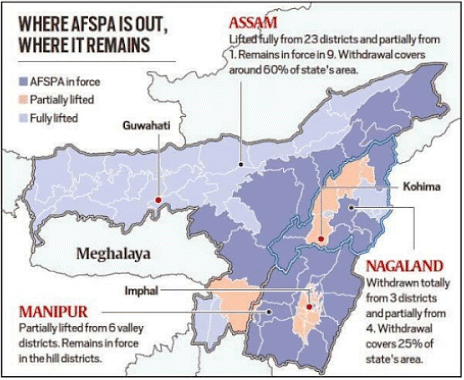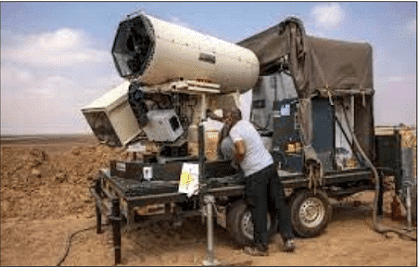Internal Security: March 2022 Current Affairs - UPSC PDF Download
1. Weapons of Mass Destruction (Amendment) Bill 2022
The Weapons of Mass Destruction and their Delivery Systems (Prohibition of Unlawful Activities) Amendment Bill, 2022 has been unanimously passed in Lok Sabha.
Background
- The Bill was introduced in Lok Sabha in the first week of April 2022 and amends the Weapons of Mass Destruction and their Delivery Systems (Prohibition of Unlawful Activities) Act, 2005.
- The 2005 Act prohibits unlawful activities (such as manufacturing, transport, or transfer) related to weapons of mass destruction, and their means of delivery.
Need For The Amendment
- To Focus On The Financial Ban On Activities Supporting WMDs
- There was an urgent need to have provision to ban financing for Weapons of Mass Destruction (WMD).
- The existing legislation was silent on this aspect.
- It also prohibits making available funds, financial assets or economic resources for any prohibited activity in relation to WMD and their delivery systems.
- To Provide More Teeth To Government To Act Against Financiers Of Such Activities.
- The present bill empowers the Government to freeze, seize or attach funds or other financial assets or economic resources for preventing such financing. It will strengthen India’s national security.
- To Fulfil India's International Obligations adhering to:
- The recommendations of the Financial Action Task Force (FATF) and
- United Nations Security Council's targeted financial sanctions against financing of WMDs.
- This legislation will strengthen India's credentials and image.

International Legislations Covering The Use Of WMDs
The use of chemical, biological, and nuclear weapons is regulated by a number of international treaties and agreements. Among them are:
- Geneva Protocol, 1925 – It banned the use of chemical and biological weapons; and
- Biological Weapons Convention, 1972, and
- Chemical Weapons Convention, 1992.
- Nuclear Non-Proliferation Treaty (NPT), 1968 and the Comprehensive Test Ban Treaty (CTBT), 1996- Use and proliferation of nuclear weapons is regulated
India’s Stand On International Legislations
- India has signed and ratified both the
(i) Biological Weapons Convention, 1972 and
(ii) Chemical Weapons Convention, 1992. - However, it has not signed the treaties regulating the use and proliferation of nuclear weapons (which includes NPT and CTBT).
2. SC Clears FCRA Changes
The Supreme Court has upheld amendments in Foreign Contribution (Regulation) Act. These amendments had introduced restrictions in the handling of foreign contributions by organizations in India. It held that receiving foreign donations cannot be an absolute or vested right and can be regulated by the Parliament.
Background
- In 2020, the government had brought amendments in Foreign Contribution (Regulation) Act (FCRA), 2010. The amendment bill received Presidential assent in September 2020 & thus became an Act.
- It was brought with the declared objective to restrict misuse and diversion of foreign funds, and to infuse more accountability in the functioning of NGOs.
- The amendments were challenged as arbitrary and stringent.
Key Highlights Of The Judgment
- Medicine vs Intoxicant Metaphor
- Foreign Contributions serves as a medicine so long as it is utilized moderately and discreetly. However, free and uncontrolled flow of foreign contribution can act as an intoxicant impacting the sovereignty and integrity of the nation
- Amendments Necessary To Strengthen The Compliance Mechanism
- The verdict noted that many NGOs, which received the funds, did not utilise the foreign funds for the purposes for which they were registered.
- It further noted that there had been cases of successive transfers and creation of a layered trail of money. This makes it difficult to trace the flow and final utilisation.
- Increase In Inflow Of Foreign Contribution
- The court noticed that the inflow of foreign contribution had almost doubled between the years 2010 and 2019.
- It further said that many of the registered associations had failed to comply with basic statutory 130 formalities. This resulted in cancellation of certificates of registration of more than 19,000 organisations.
- Read Down Section 12A Of The Amended Act
- The apex court read down Section 12A which made it mandatory for all office-bearers of NGOs to provide Aadhaar number.
- The verdict held that producing Indian Passport for the purpose of their identification would be enough.
- A Country Can Even Completely Prohibit Acceptance Of Foreign Donations
- The court said a country can even completely prohibit acceptance of foreign donations.
- This can be done on the ground that it undermines the constitutional morality of the nation
3. AFSPA From Parts Of Northeast Is Withdrawn
- The Centre has significantly reduced the footprint of the Armed Forces Special Powers Act (AFSPA), 1958 in the Northeast.
- It has been withdrawn entirely from 23 districts in Assam; and partially from seven districts in Nagaland, six districts in Manipur, and one district in Assam.
After Being In Force For Many Years, Why Has AFSPA Been Withdrawn Now?
- Over the last two decades, various parts of the Northeast have seen a reduction in insurgencies.
- A number of major groups were already in talks with the Indian government, and these talks received traction during the current regime.
- In Nagaland, the killing of 14 villagers in Oting, Mon, is seen as having a telling impact on reviving the demand to repeal AFSPA
5. Neptune: Anti-ship Cruise Missile
Why in News?
Recently, Ukraine claimed that it has damaged the Russian Black Sea Fleet Flagship ‘Moskva’ by Neptune Anti-Ship Cruise Missiles.
What is Neptune?
- The Neptune is a coastal anti-ship cruise missile that is capable of the destruction of naval vessels in a range of 300 km.
- The Missile system was inducted into the Ukrainian Defence Forces in March 2021 after being in development for six years.
- The cruise missile was developed in haste by the military as the Russian threat to the coastal areas of Ukraine was growing rapidly since the occupation of Crimea in 2014.
- The design of this missile is based on a Russian Kh35 cruise missile which goes by the North Atlantic Treaty Organization (NATO) name of AS-20 Kayak.
- The cruise missile attack was carried out using TB-2 drones as decoys along with other measures toward saturation of the cruiser’s Air Defence systems.

What is Moskva?
- Moskva is a guided missile cruiser of the Russian Navy named after the city of Moscow. A cruiser is a large surface warship built for high speed and great cruising radius, capable of not only defending its own fleet and coastlines but also threatening those of the enemy.
- The Moskva was originally commissioned as the Slava in 1983. It was recommissioned in 2000 as the Moskva with refurbished weapon systems and electronics.
- It has a displacement of 12,490 tons.
- It is the flagship of the Black Sea Fleet of the Russian Navy and carries a crew of around 500 personnel
6. Israel’s New Laser Missile Defense System
Why in News?
Recently, Israel has successfully tested a new laser missile defence system, it has intercepted mortars, rockets and anti-tank missiles
- Israel’s Iron Dome defense system has been a great success, with a 90% interception rate against incoming rocket fire.
What is a Laser Missile Defence System?
- The Israeli-made laser system, known as the “Iron Beam,’’ which is designed to complement a series of aerial defence systems, including the more costly rocket-intercepting.
- The Iron Beam’s interceptions are silent, they’re invisible. It is using Directed-Energy (DE) weapon system and can go a long way in providing aerial defence. A DE weapon is a system using DE primarily as a direct means to disable, damage or destroy adversary equipment, facilities, and personnel.
- Little is known about the laser system’s effectiveness, but it is expected to be deployed on land, in the air and at sea.
- It is an effective, accurate, easy-to-operate tool that is significantly cheaper than any other existing means of protection.

7. Central Armed Police Forces Reforms
Why in News
Recently, the Government of India told the Lok Sabha that nearly 1,200 paramilitary troopers died by suicide in last 10 years.
- Also, more Central Armed Police Force (CAPF) personnel died by suicide in the Covid-19 pandemic years of 2020 and 2021.
- Domestic problems, illness and financial problems are some of the contributory factors among others behind the incidents of suicide.
What are Central Armed Police Forces?
- The Ministry of Home Affairs maintains seven CAPFs: The Central Reserve Police Force (CRPF), which assists in internal security and counterinsurgency. The Central Industrial Security Force (CISF), which protects vital installations (like airports) and public sector undertakings. The National Security Guards (NSG), which is a special counterterrorism force.
Four border guarding forces, which are the Border Security Force(BSF), Indo-Tibetan Border Police (ITBP), Sashastra Seema Bal (SSB), and Assam Rifles (AR).
What are Major Functions of CAPFs?
- Border Security: Safeguard the security of borders of India and promote a sense of security among the people living in border areas. Prevent trans-border crimes, smuggling, unauthorised entry into or exit from the territory of India and to prevent any other illegal activity.
- Industrial Security: Provide security to sensitive installations, persons at security risk.
- Other Functions: Counter Insurgency Operations, Anti Naxal Operations, Internal Security Duties, VIP Protection, Lead Intelligence Agency, Security To Diplomatic Missions Abroad, United Nations(UN) Peacekeeping Operations, Disaster Management, Civic Action Nodal Agency for UN Police Missions, etc.
What are Associated Issues with CAPFs?
- Working Conditions: The Standing Committee on Home Affairs in the year 2017 had expressed concern over the working conditions of personnel of the border guarding forces. The Committee observed that they had to work 16-18 hours a day, with little time for rest or sleep. The personnel were also not satisfied with medical facilities that had been provided at border locations. In addition, the Standing Committee observed that personnel of the CAPFs have not been treated at par with the Armed Forces, in terms of pay and allowances.
- Impediments to Modernisation: The MHA has been making efforts to provide modern arms, ammunition, and vehicles to the CAPFs. The Plan aims to provide financial support to CAPFs for modernisation in areas of arms, clothing, and equipment. However, the Estimates Committee observed that the procurement process under the Plan was cumbersome and time consuming
- Burdened By States’ Responsibilities: There is heavy dependence of states on CAPFs, even for everyday law and order issues. This affects the anti-insurgency and border guarding operations, besides curtailing the training needs of these forces.
- Cadre Management Issue: Each of the seven has its own cadre of officers, but they are headed by officers of the Indian Police Service. This has a demoralising effect on the officers of the CAPFs, and impacts the effectiveness of the forces. In addition, there was frustration in CAPFs due to stagnation in promotions and lack of cadre review.
- Increasing Cases of Fratricide: There have been more than 25 incidents of fratricide (killing of one’s brother or sister) reported in the forces since 2019.
What can be the Way Forward for CAPFs?
- Modernising the CAPFs: MHA should ensure the bottlenecks in procurement should be identified and corrective action should be taken. Moreover, given the evolution of hybrid warfare, the contents of training should be a mix of conventional matters as well as latest technologies such as ICT, and cyber security.
- Augmenting States’ Capacity: States must develop their own systems, and augment their police forces by providing adequate training and equipment. The central government should supplement the efforts of state governments by providing financial assistance and other help needed by states for capacity building of their forces.
- Corrective Measures in Cadre Policy: Citing the dissatisfaction in Cadre policy, Joshi Committee recommended that top positions should be filled from the respective cadre of the CAPF. Further, the Committee recommended that cadre review of all the CAPFs should be carried out within a defined timeline. It is high time to implement these recommendations as soon as possible.
- Personnel Reforms: Workshops on stress management should regularly be undertaken, and yoga and meditation be made part of the daily exercise for CAPF personnel.
Further, the provision of accommodation near the deployment of the respective force, to enable personnel to meet their family members, can also be explored.
Read more on “Internal Security” on
FAQs on Internal Security: March 2022 Current Affairs - UPSC
| 1. What is internal security and why is it important? |  |
| 2. What are some key challenges to internal security in March 2022? |  |
| 3. How does the government ensure internal security in March 2022? |  |
| 4. What role does the police play in maintaining internal security in March 2022? |  |
| 5. How can individuals contribute to enhancing internal security in March 2022? |  |

























